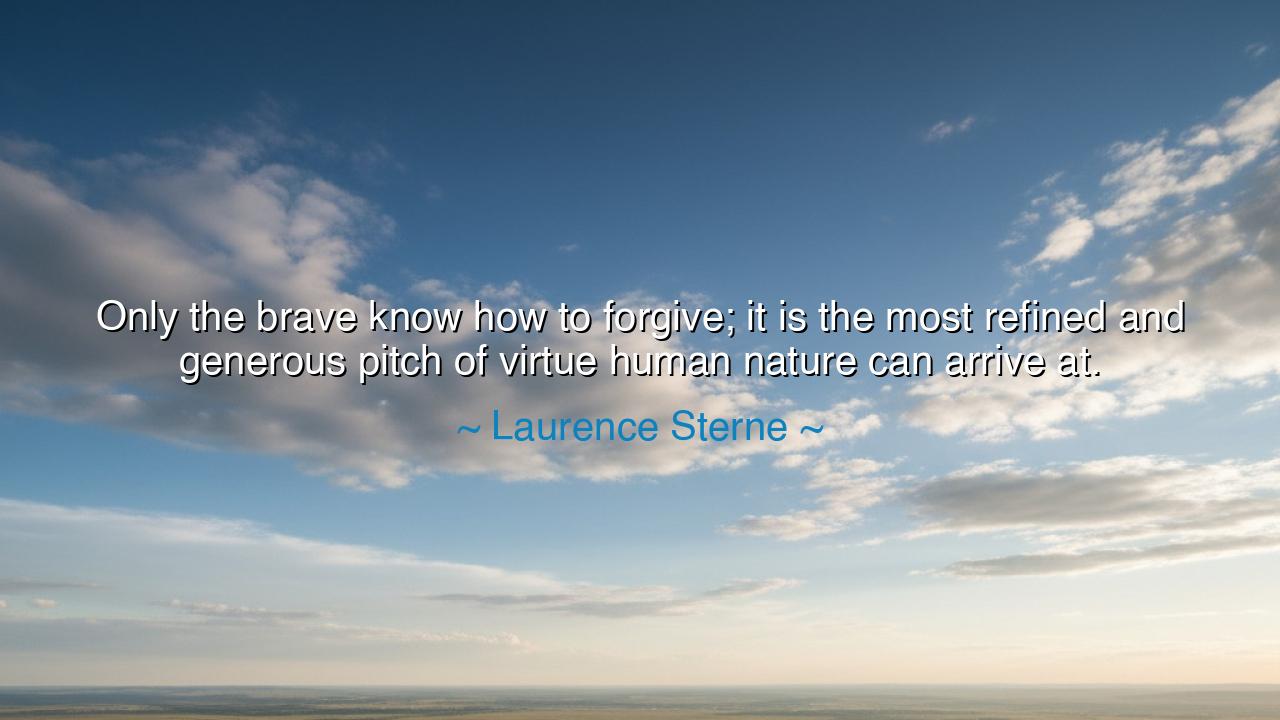
Only the brave know how to forgive; it is the most refined and
Only the brave know how to forgive; it is the most refined and generous pitch of virtue human nature can arrive at.






Laurence Sterne, the English clergyman and novelist, once wrote with piercing clarity: “Only the brave know how to forgive; it is the most refined and generous pitch of virtue human nature can arrive at.” In this utterance lies a paradox: what the world often calls weakness, he names as strength; what men see as surrender, he proclaims as the highest victory. For forgiveness is no small thing—it is not the indulgence of the timid, but the triumph of the courageous, who dare to release the chains of anger when others would clutch them tighter.
The origin of Sterne’s words is found in his reflections on human nature, penned during the 18th century, a time when honor was defended by duels, and vengeance was thought noble. Against such a backdrop, his teaching strikes like thunder. He declares that to forgive is not to lower oneself, but to rise above the common passions that enslave men. Hatred is easy, resentment natural, vengeance instinctive—but forgiveness is divine. It is, as he says, the “most refined and generous pitch of virtue,” the summit to which human virtue can climb, where justice is tempered with mercy and the soul is freed from its own poisons.
History itself bears witness to this truth. Consider the example of Abraham Lincoln, who during the Civil War was urged to treat his enemies with merciless punishment. Yet Lincoln famously said, “Do I not destroy my enemies when I make them my friends?” After the war, rather than drench the land in vengeance, he spoke of binding the nation’s wounds “with malice toward none, with charity for all.” This act of forgiveness required immense bravery, for it defied the cry for revenge that thundered in his time. But in that courage, Lincoln reached the “refined pitch of virtue” Sterne described, showing the world that true greatness lies not in punishing, but in pardoning.
Forgiveness is heroic because it costs much. To forgive is to lay down one’s pride, to surrender the intoxicating sweetness of revenge, to endure the wound without striking back. The coward cannot do this, for he fears appearing weak. The proud cannot do this, for he worships his own honor above peace. But the brave, who master themselves, can. They rise above the wound inflicted upon them, refusing to let their enemies dictate their hearts. In this way, forgiveness is not a concession, but a conquest—not the yielding of the soul, but its crowning victory.
Yet we must not think forgiveness is forgetfulness, nor that it erases justice. Sterne’s wisdom is subtle: to forgive is not to say the wrong was right, but to release oneself from the prison of wrath. Justice may still act, but the heart is not consumed by bitterness. Thus, forgiveness refines human nature, purifying it of its baser passions, lifting it nearer to the divine. To forgive is to live as gods among men, not in arrogance, but in mercy.
The lesson for us is clear: if you would live nobly, practice forgiveness. When wronged, pause before anger, and ask: “Shall I be mastered by this injury, or shall I master myself?” Remember that resentment is a chain you clasp upon your own soul. Forgiveness is the sword that cuts it away. If great leaders, saints, and sages could forgive even grave injuries, can we not forgive the smaller wounds of daily life? The brave answer is yes.
Practically, this means cultivating forgiveness as a discipline. Begin with small matters: forgive the slight, the insult, the inconvenience. Then, when deeper injuries come, your soul will be prepared. Speak forgiveness even when you do not feel it, and in time the heart will follow the tongue. Seek also to forgive yourself, for often we are harsher to our own souls than to others. In this way, you rise above the common path and climb toward the summit of virtue Sterne exalts.
Thus, Laurence Sterne’s words remain a clarion call: forgiveness is the highest courage. It is the crown of human virtue, the mark of the brave. Let us then not glory in vengeance, but in mercy; not in hatred, but in love. For only when we forgive do we free ourselves, and only in freedom can we live as noble souls, refined and generous, heirs of a virtue that transcends the ages.






AAdministratorAdministrator
Welcome, honored guests. Please leave a comment, we will respond soon